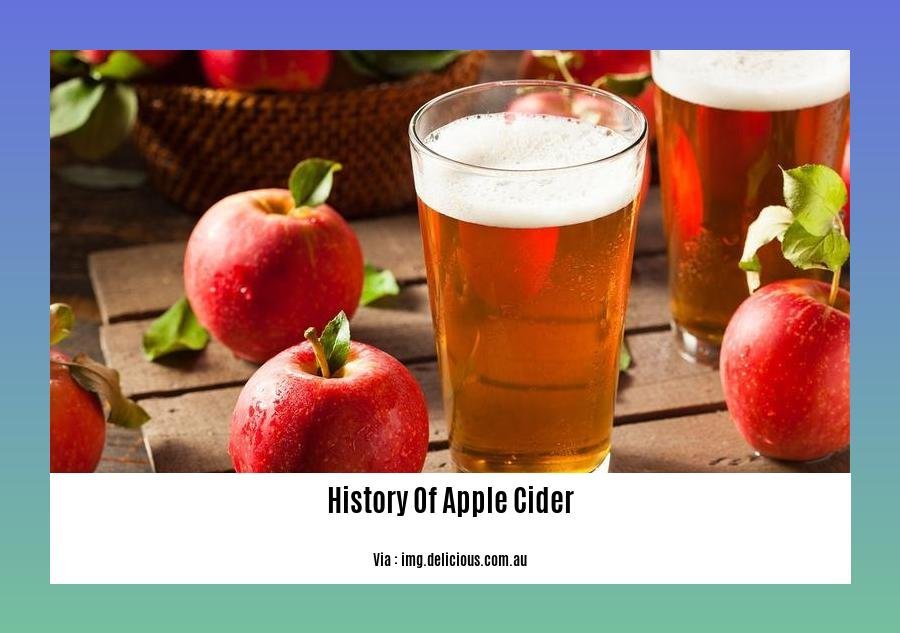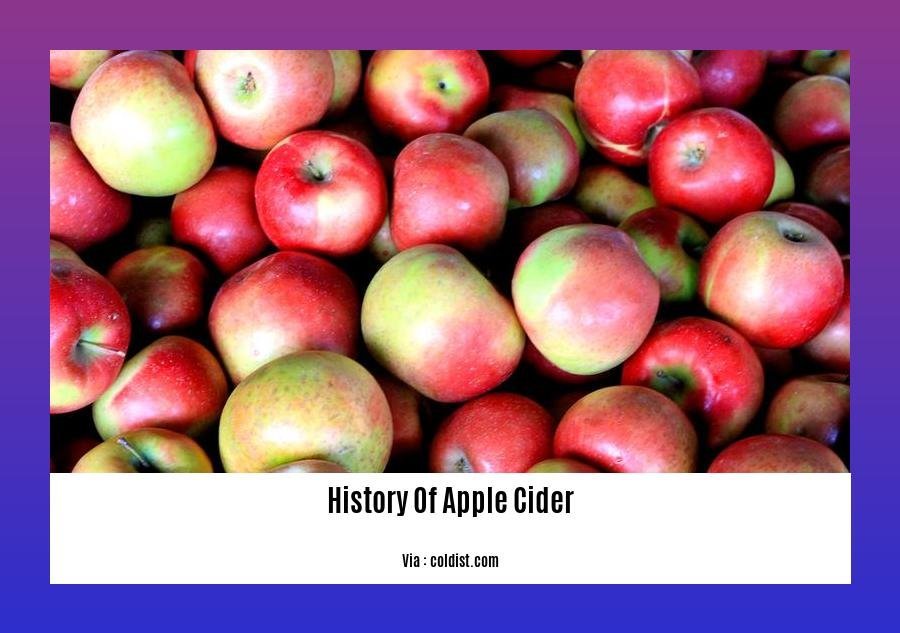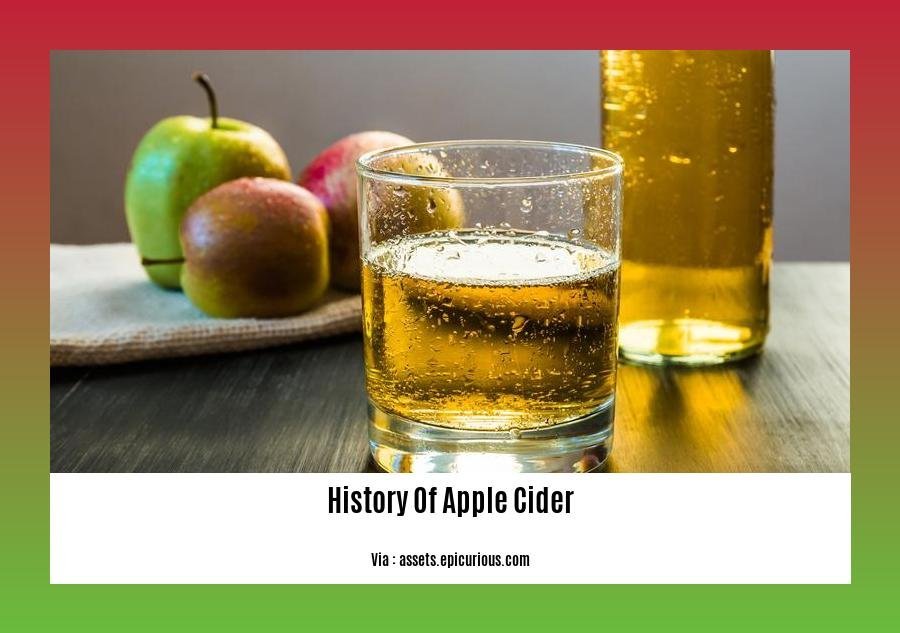Embark on “The Rich History of Apple Cider: A Journey Through Time” to uncover the enchanting chronicles of this beloved autumnal beverage. From its humble origins in ancient cultures to its momentous arrival in America, we delve into the fascinating narrative of apple cider, tracing its evolution and celebrating its cultural significance.
Key Takeaways:
- Cider has been around since at least 55 BCE.
- The Normans brought cider to England in the 9th century.
- Colonists introduced cider to the Americas.
- Hippocrates prescribed apple cider vinegar for medicinal purposes as early as 400 B.C.
History of Apple Cider

Apple cider, a beloved autumnal treat, boasts a rich history spanning centuries. Let’s trace its captivating journey:
Ancient Origins
The roots of apple cider stretch back to ancient times. Julius Caesar’s invasion of Britain in 55 BCE marked the first recorded mention of cider. As the Romans introduced apple orchards and viticulture, cider-making flourished.
Medieval Era
During the Middle Ages, the Normans played a pivotal role. They brought apple orchards and the term “cider” to England, where it quickly became a favorite beverage. Monks played a significant part in its production and distribution, establishing cider as a staple of medieval life.
Colonial America
Europeans brought their passion for cider to the New World. Early American colonists established apple orchards and embraced cider-making. In fact, apple cider was once more popular than beer in colonial America!
Medicinal Uses
Hippocrates, known as the Father of Medicine, prescribed apple cider vinegar for its healing properties around 400 B.C. Throughout history, people relied on cider vinegar for its purported medicinal benefits.
Modern Popularity
Today, apple cider remains a beloved beverage, enjoyed by people worldwide. From sipping warm cider on a crisp fall day to using it in culinary preparations, apple cider holds a special place in our hearts.
Did You Know?
- Apple cider is made from pressed apple juice that undergoes a natural fermentation process.
- Cider varies in sweetness levels, from dry to sweet, depending on the apple varieties used and fermentation time.
- Apple cider is a good source of vitamins, minerals, and antioxidants.
Uncover the intricate apple cider production process, from fruit selection to fermentation and bottling.
Exploring the remarkable health benefits of apple cider is an eye-opening experience, revealing its power as a natural remedy.
Discover the countless uses of apple cider, from culinary delights and household cleaning to medicinal applications and beyond.
History of Hot Apple Cider

Join us on a captivating journey through time as we explore the history of hot apple cider, a beloved autumnal treat that has warmed hearts and delighted taste buds for centuries. From its humble origins to its widespread popularity today, let’s uncover the fascinating tales and traditions that have shaped this delectable beverage.
Ancient Roots:
- Apple trees originated near the Nile River in ancient Egypt, and early civilizations enjoyed a fermented apple drink similar to cider.
- Julius Caesar encountered cider during his invasion of Britain in 55 BCE, and the Romans introduced apple trees and cider-making techniques throughout their empire.
Medieval Popularity:
- In the Middle Ages, apple cider became a staple beverage in Europe, particularly in England and Normandy.
- The Normans brought apple orchards and the term “cider” to England in the 9th century.
- Monks played a significant role in preserving and refining cider-making techniques during this period.
Arrival in the New World:
- Early colonists brought their love of cider from England to the Americas.
- Apples flourished in the New World, and cider became a popular and affordable drink among settlers.
- Colonists developed nonalcoholic cider due to the lack of preservation methods and religious beliefs.
19th Century Boom:
- The 19th century witnessed a boom in apple cider production in the United States.
- Advances in refrigeration and transportation made it possible to distribute cider more widely.
- Hot apple cider emerged as a favorite cold-weather beverage, enjoyed at gatherings and festive occasions.
Modern Day:
- Apple cider remains a popular beverage today, enjoyed by people of all ages.
- It is often associated with autumn and holiday celebrations.
- Modern cider-making techniques have expanded, resulting in a wide range of ciders to suit diverse tastes.
Key Takeaways:
- Apple cider has a long and rich history, dating back to ancient times.
- Colonists brought cider-making knowledge to the New World, where it became a popular beverage.
- In the 19th century, apple cider production boomed in the United States.
- Hot apple cider is a cherished cold-weather beverage, associated with autumn and holiday cheer.
Most Relevant URL Source:
- The History of Apple Cider – Back Then History
FAQ
Q1: Where did apple cider originate?
A1: Apple cider originated near the River Nile in ancient Egypt, and was brought to North America by colonists.
Q2: How did the history of apple cider in America begin?
A2: Colonists brought apple trees and cider-making knowledge to the New World, where they developed nonalcoholic versions due to a lack of preservation methods.
Q3: When was the first recorded reference to apple cider?
A3: The first recorded reference to apple cider dates back to 55 BCE, during Julius Caesar’s invasion of Britain.
Q4: Why did apple cider’s popularity decline?
A4: Apple cider’s popularity declined when beer became a more popular drink.
Q5: What was the significance of hot apple cider in the past?
A5: Hot apple cider was a popular drink in the past, especially during cold weather, and was often associated with festivals and gatherings.
- Unlock 6000+ words beginning with he: A comprehensive analysis - April 20, 2025
- Mastering -al Words: A Complete Guide - April 20, 2025
- Master Scrabble: High-Scoring BAR Words Now - April 20, 2025






![The Evolution of the Apple Store: A Comprehensive Timeline of Retail Innovation [Apple Store History Timeline] apple-store-history-timeline_2](https://www.lolaapp.com/wp-content/uploads/2023/12/apple-store-history-timeline_2-150x150.jpg)









